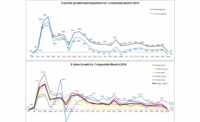Regional Sausage Powerhouse's
By Sam Gazdziak, Senior Editor
Five companies have succeeded in the competitive sausage market by building a strong presence in their respective markets.
If it weren’t for regional sausage makers, generations of Texans may have gone without eating a hot sausage. The griller may never have come to Pennsylvania. And the pomegranate sausage may never have been made.
The companies profiled on the following pages range in size from 40 to hundreds of employees. They may sell their product across an entire region, in a handful of states, or in a handful of cities. But they have found their niches and developed tastes that brings customers back. More importantly, they have all succeeded at their businesses.
Five unique stories
The oldest of the companies is Elgin Hot Sausage Co., Elgin, TX, which began in the 1880s and was bought by Ernest Bracewell in 1968. The sausage itself is a local tradition that dates back to when farmers would come to town on Fridays and Saturdays to sell their goods, he says. The “hot” in the hot sausage refers to both the temperature at which it was served and the amount of spice it had. “We’ve had to cool it down because not everybody can eat the extra-hot version,” Bracewell says.
Covering the Southeast is Manda Fine Meats, Baton Rouge, LA. The company started in 1947 as a food distributor, but it has since further diversified into smoked sausage and deli- meat processing. One of the company’s strengths is the authenticity of its product, says Bobby Yarborough, chief executive officer.
“True Cajun spices and seasonings are hand-rubbed throughout the meat, not applied on just the outside of the product,” he says.
Uncle Charley’s Sausage Co., Vandergrift, PA, took a Midwestern staple and brought it to the East Coast. “I was in Milwaukee, and I saw these links that are about five-and-a-half inches long, and I brought them to the Pittsburgh market,” says Charles Armitage, president. The grillers come in about a dozen different varieties, and they are sold throughout western Pennsylvania as well as in Ohio, West Virginia, and Maryland.
Not only does Cher-Make Sausage Co., Manitowoc, WI, sell its popular Cher-Make and Smoky Valley Sausage brands in the upper Midwest, but it has also become a popular private-label manufacturer and co-packer. “We’ve worked hard to earn the reputation of servicing [our customers] very well and being a trouble-free supplier,” says John Grosser, director of sales and marketing, “and we offer them a high-quality product at a very competitive price.”
The son of a butcher, Jody Maroni entered the sausage-manufacturing world by opening up a location on the Venice Beach boardwalk in Southern California. More than 25 years later, Jody Maroni’s Sausage Kingdom has numerous locations, not to mention wholesale distribution. His unique creations include everything from a tequila chicken sausage to the aforementioned pomegranate and almond sausage. “I see things that I like in some other food, usually in fancy restaurants, and I try to figure out how I am going to get that into the casing so that the whole experience can be eaten,” Maroni says of the creative process.
Promotional efforts
Many of the companies relay they’re using the traditional methods of promotion — namely, getting a grocery store to stock their sausage and then running promotions to attract customers. Several produce radio and television ads. Two of the companies, Jody Maroni’s and Elgin Hot Sausage, also have the advantage of being able to sell their products through restaurants or stands. Elgin’s Southside Market & BBQ has been around almost as long as the Hot Sausage, and Jody Maroni’s stands operate throughout California and in high-traffic areas across the country, such as airports, convention centers, and malls. “Basically, [our products are found] wherever people want to have fun, enjoy themselves, and are looking for a great item that’s a value-added product,” explains Rich Leivenberg, executive vice president.
Trying to get space in a grocer’s freezer is not always an easy proposition, explains Ernest Bracewell. “You’ve got to work harder to get it in the stores [than a national company], because you have to fight for the space and ensure that the product sells,” he says.
Still, there are some advantages that the regional companies enjoy over their national competition. A smaller batch size, for example, allows Jody Maroni’s to experiment with a Cuban- or Indian-style sausage. Cher-Make is able to provide a turnaround that a larger company couldn’t accomplish. “When someone calls [us] and says ‘We’d like an Andouille or Cajun-style sausage made this way, we can probably have that product to them in about a week,” says Grosser. “If someone has an item that is similar to what we currently make, we’ll get the product out within a day or two for them to look at [and] test.”
Despite their strong niches in the market, the companies are all looking to grow — either by expanding their product line or their reach. For Manda Fine Meats, while its smoked sausage is sold predominantly in the Southeast, “our sausage sales are growing outside the South… with sales in Illinois, Minnesota, and Iowa,” Yarborough relays.
In the end, it is the quality of the sausage that will bring customers back to the restaurant or the grocery store, and high-quality products is one thing all five companies have in common. “We try to make a really great-looking product,” says Uncle Charley’s Armitage. “We make a very pretty product that’s got good color. The good looks will get you to try it, and the good taste will bring you back.”

